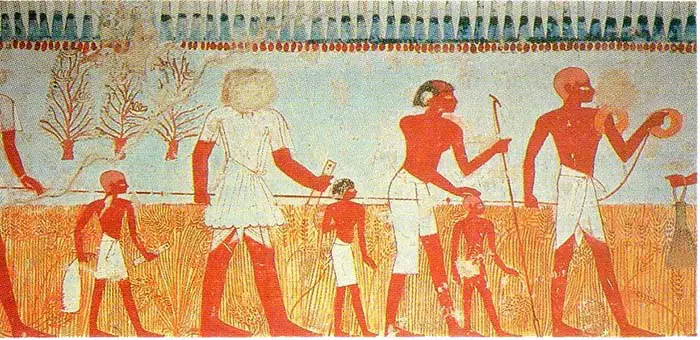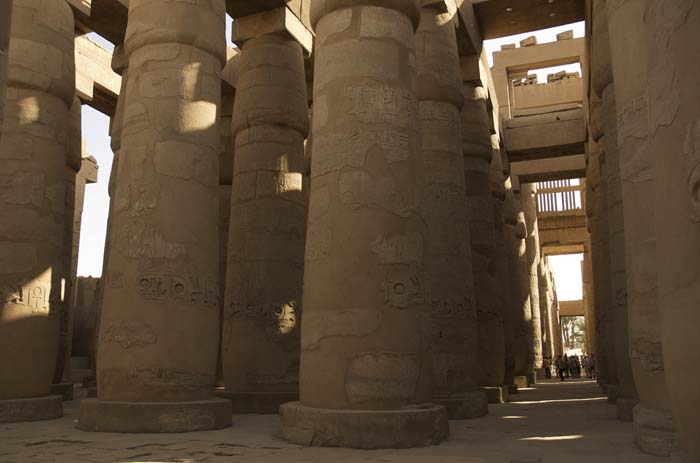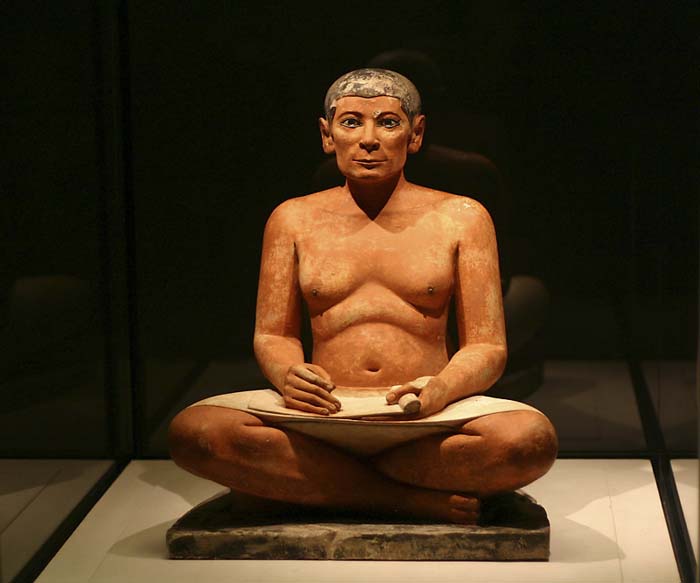Jobs in Ancient Egypt
Just like in any other civilization, the economy of Ancient Egypt relied on a variety of skilled and unskilled labor. There were many different careers available in Egypt, ranging from breaking rocks in mines to making scientific discoveries in a university. Over the course of 3,000 years, the ancient Egyptian empire remained remarkably stable. The same basic jobs were an essential part of ancient Egyptian civilization throughout the centuries.
Jobs for Slaves in Ancient Egypt
A lot of people are under the misconception that most jobs in ancient Egypt, particularly building the pyramids, was accomplished with slavery. The reality is that there were not that many slaves in Egypt until the Greeks conquered the nation and ended the ancient Egyptian dynasties. Only the wealthiest could afford to buy slaves from markets to do the work in their households. These slaves were typically prisoners of war.
Jobs in ancient Egypt for slaves included working in mines, plowing fields, cleaning households, watching a master's children, tending gardens, or taking care of horses. Though slavery was rare, many peasants barely had more freedom than a slave. If they worked on land owned by a nobleman, they often gave him most of their crops, and their labor could be sold or rented along with the land.
Jobs Among the Egyptian Lower Class
Ancient Egypt jobs for peasants were very similar to jobs for slaves. However, they had more legal rights, and they could potentially rise through the social classes with a lot of diligence and effort. Though they had limited freedom, they did receive wages, had free time, and could make their own decisions about things like marriage or having children.
Farmers
Farming was the backbone of ancient Egyptian society, and it was one of the most common jobs. Some farmers worked the land of their local nobleman, while more prosperous ones posessed their own land that was passed on to their descendants.
Farming was usually a job that was done by the entire family. After each yearly flood of the Nile, farmers waited until the waters receded to plant their crops. The most common crops were wheat, corn, and barley. Farmers also planted vegetables, melons, pomegranates, figs, and flax. This was a tough and dangerous job because a farmer would lose their livelihood if the Nile failed to flood.

© GoShows - Illustration of Farmers in Ancient Egypt
Servants
Servants were people who were attached directly to the household of a higher-status Egyptian. Jobs for servants in ancient Egypt could include cooking, cleaning, running errands, babysitting children. Though being a servant was definitely one of the ancient Egypt jobs done by peasants, it was relatively comfortable. Though servants were subject to the whims of their masters, they had more reliable food sources than farmers.
Builders
Ancient Egyptian pharaohs were known for their massive building projects like obelisks and pyramids. At almost any time period, there were jobs in ancient Egypt for builders. Builders included all of the stonemasons, manual laborers, bricklayers, wood carvers, and mortar-mixers who would be needed in any building project. This was often exhausting work that required a lot of physical strength and endurance.

© Depiction of workers moving a colossus
Common Soldiers
Any Egyptian who desired to join the military was allowed. This made it a highly sought after job for people who were tired of being farmers. Being a soldier came with many downsides since soldiers ran the risk of dying in battle.
Though being a soldier was risky, a man who distinguished himself in battle could potentially rise in the ranks and make a name for himself. However, the life of the soldier required hours of compulsory drilling and tough punishments for any man who fell behind, so it was not always pleasant.

© Tim Dawson - Relief of Egyptian Soldiers
Jobs in Ancient Egypt for the Middle Class
Unlike many other countries where everyone was either a peasant or a nobleman, Egypt had a very large middle class. These people tended to live in cities or on small country estates. They made a decent amount of money from skilled labor, so they could afford to buy food and other items instead of making it themselves.
Middle class laborers were often men who could afford to support a family, so all middle class women did not work like lower class women did. However, some women worked alongside family in shops or ran their own business.
Craftsmen
Craftsmen were responsible for most of the beautiful goods that Egypt is known for in modern times. They made the sculptures and beautiful gold jewelry that was found in Egyptian tombs. A craftsman who made fine goods for the nobility was very well off, but even more common craftsmen who made cooking pots or wove clothing lived a comfortable life. Most craftsmen resided in cities and sold their items in family shops or at markets.
Merchants
Many ancient Egypt jobs centered around trade with other cities and nations. Some merchants bought fine wares and traveled in caravans to sell them. Others built shops to sell acquired goods in a single location. Merchants typically accepted payment in coins, but they would also sometimes accept barter goods like beer or food.
Architects
Being an architect was one of the very highly respected ancient Egypt jobs because architects had to study mathematics and physics before starting their trade. If an architect managed to get a government contract for a prestigious civic project, he could even join the upper class. Most architects learned the trade from their parents, but others learned how to plan buildings and roads through an apprenticeship.

© Rick Manwaring - The Great Hypostyle Hall, Temple of Amun, Karnak
Jobs Done by Upper Class Egyptians
Upper class Egyptian noblemen were sometimes so wealthy that they could just survive on the profits of their land that was worked by farmers. However, many other upper class people still needed jobs in ancient Egypt. They prospered in prestigious and well paying jobs.
Military Officers
Life as a common soldier may not have been very pleasant, but being a military officer was another matter. Second sons of noblemen who could not inherit often chose to join the military.
During times of peace, they were often sent to oversee government projects or just live in barracks. In war time, a devoted and bright military man could quickly rise in the ranks. Generals were so well-respected that some became pharaoh eventually.
Scribes
People who could write in the complicated Egyptian hieroglyphs were highly sought-after. Anyone who could afford the scribe school fee could enter the school and learn how to write. After passing extensive exams, scribes could work for the government, write books, write letters for noblemen, or write coffin texts for gravesites.

©Ivo Jansch - Statue of a Seated Scribe, displayed at the Louvre
Government
The vast Egyptian bureaucracy needed a lot of workers to run efficiently. A vizier collected taxes and reported directly to the king. Most villages were run by a governor or overseer who reported to the vizier. Huge armies of scribes worked underneath overseers to keep records of taxes and laws.
Priests
Priests were often the wealthiest members of upper class Egyptians. They received a portion of all sacrifices and ofte lived in luxury. However, being a priest came with some risks. If the god you served became unpopular, your temple could be destroyed and you would be destitute.
Interesting Facts About Jobs in Ancient Egypt
- Most Egyptians followed in their parents footsteps and took over the family business.
- Many farmers went to work for the Pharaoh as builders or soldiers while the Nile was flooded each year.
- If a commoner managed to get a position like "artist of the Pharaoh" or "doctor of the Queen," they were basically set for life and immediately became a member of the upper class.
- Priests were allowed to marry, and often passed down their position to their child.
- Bureaucrats were expected to be very polite and follow rigorous etiquette at all times. This is where the term "civil servant" originates from.
